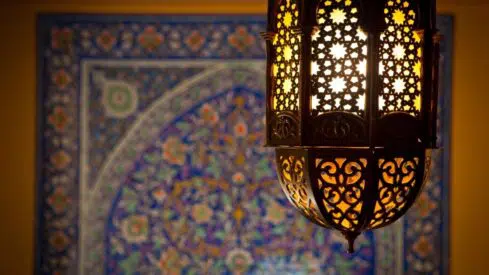Ramadan is a level playing field where people compete in good actions and generosity with one another. During this auspicious month, souls are taught virtue and become acclimated to dignity, learning to dislike vices and sins and acquiring all excellent qualities.
Whoever witnesses this month without benefiting from it is truly impoverished, and nothing cripples him more than indifference, laziness, procrastination, and false expectations.
What is shocking, though, is seeing some of people who were prompted to do good deeds and draw nourishment from virtues throughout this month hurriedly demolish what they had constructed, replacing good with evil. This is a grave error and a disgraceful deed in the genuine sense of the word, and no amount of regret or apologies will make it go away when you stand before your One Lord.
Bishr, May Allah have mercy on him. “They are awful people, since they only know Allah The Almighty during the month of Ramadan,” he replied when questioned about those who only become diligent during the month of Ramadan. Those who worship Allah, The Almighty, persistently throughout the year are genuinely righteous.”
“Which is better: Sha’ban or Rajab?” was asked of Ash-Shibli, may Allaah have mercy on him. “Be a worshipper of Allah The Almighty rather than a worshipper of Sha’ban,” he said.
‘Aa’ishah may Allah be pleased with her was asked, ‘Did the Messenger of Allah sallallaahu `alayhi wa sallam choose some special days (for fasting)?’ She replied, ‘No, but he used to be regular (constant) (in his service of worshipping).’ The Prophet sallallaahu `alayhi wa sallam also never performed more than eleven Rak‘ahs (units of prayer) whether in Ramadan or at any other time of the year.
Out of worry, we really ask such people to examine their lifestyle, review themselves, and consider their situation before it is too late. We encourage them not to be deceived by appearances, strength, health, or youth. That’s because everything here is only a mirage. It may appear to be water, but once you get there, you’ll discover nothing. Sickness will follow health, youth will follow old age, and strength will eventually give way to weakness.
So, get up and start paying attention! Life is short, even though it appears to be lengthy, and happiness, no matter how long it lasts, will come to an end.
Perseverance and loyalty to the straight path, as well as allegiance to Allah, are required of such people. One of the most powerful signals of acceptance of one’s good efforts is the appearance of the Almighty. Allah The All-Powerful Says (what it means): “And worship your Lord until the certainty (of death) comes to you.” [15:99 in the Quran]
As a result, the souls should continue to follow the straight and guided path, just as they did during Ramadan. Guidance is not limited to specific times or acts of worship, and Allah’s allegiance is not conditional. Ramadan is not the only month in which the Almighty is active.
“Allah has not established an end for the believer’s job other than death,” remarked Al-Hasan Al-Basri, may Allah have pity on him. Then he recited, “And worship your Lord until the certainty (death) comes to you.” [15:99 in the Quran] Although Ramadan has come to a conclusion, you still have various new seasons in which to pray. The five daily prayers are among the highest and best good actions, and prayer will be the first question asked of a person when he appears before Allah The Almighty on the Day of Judgment.
After Ramadan, there are the voluntary fasts and events such as the six days of Shawwal, Mondays and Thursdays, the white days, Muharram’s tenth day, the Day of ‘Arafah, and so on.
If Ramadan’s night prayer has concluded, you should know that the night prayer can be said at any time: [Quran 51:17] They used to sleep only a little at night.
If Zakat Al-Fitr has passed, there is still the mandatory Zakah to pay in addition to the several methods to give voluntary charity.
Dear Muslim brother, you should be aware that one of the characteristics of Allah The Almighty’s slaves is that they consistently execute good acts, as Allah The Almighty says (what means):
{Those who are constant in their prayer}[Quran 70:23]
{And they who carefully maintain their prayers -}[Quran 23:9]
If you want to learn how to get out of this bind and execute good things on a regular basis, you must do the following:
Istighfaar (seeking Allah’s forgiveness)
All good deeds should come to an end with Istighfaar. It is also used to close prayers, Hajj, night prayers, and meetings. Fasting should be completed with Istighfaar in order to atone for whatever acts of forgetfulness, negligence, or perversion we may have committed. Istighfaar removes arrogance and ostentation from the heart and allows one to feel his flaws. After Ramadan, it is this emotion that motivates people to do more good deeds and get more blessings.
Keep fasting
1- Make up for fast days missed
If a Muslim has missed Ramadan fast days due to a genuine reason such as illness, travel, or menses in the case of women, he or she should make up for them as soon as possible.
2- Shawwal’s Six-Day Fast
Fasting for six days in the month of Shawwal is highly encouraged by the Sunnah. In Shawwal, fasting for six days brings enormous rewards and blessings from Allah Almighty. “Whoever fasts the month of Ramadan and then (fasts) six days of Shawwal, it is as if he has fasted the whole year,” the Prophet (peace and blessings be upon him) is supposed to have remarked. (Muslim)
It is crucial to note that a Muslim does not have to fast all six days of Shawwal in a row. Inshaa’ Allah, everyone who fasts for six days, whether consecutively or individually, will complete the obligation and earn the same rewards.
3 – Mondays and Thursdays are fast days.
4- Fasting during the thirteenth, fourteenth, and fifteenth days of each lunar month.
Set a time for reciting Qur’an
On the Day of Judgment, fasting and the Qur’an will intercede for the servant. The Messenger of Allah said: “Both fasting and the Qur’an will intercede for a servant on the Day of Judgment,” according to ‘Abdullah Ibn ‘Amr, may Allah be pleased with them. ‘O Lord!’ fasting will exclaim. During the day, I have made him give up food and (sexual) desire. Please accept my intercession on his behalf.’ ‘O Lord!’ says the Qur’an. I’ve woken him up in the middle of the night. Please accept my intercession on his behalf.’ As a result, their assistance will be acknowledged on his behalf.” [According to Ahmad’s Musnad] As a result, we should begin memorising Allah’s Book. Recite what you learned at prayer and continue to recite the Qur’an as much as possible.
Give regular Sadaqah
The magnificence of Sadaqah is felt when we realise that we are trading with Allah (Subhanhu Wa Ta’ala), the Most Generous; He is the One who gave us our money in the first place, but He is not demanding that we return it! He’s demanding to us, “Who lends Allah money?” Would we be stingy if we were offered a terrific business opportunity with great people? We even wish we had additional funds to put into that investment! What about Allah, then? Sadaqah allows you to transact directly with Allah, which is one of its benefits. It is not necessary for charity to be a monetary Sadaqah, but it does have a broader meaning.
“On every joint of man, there is charity, on every day when the sun rises,” the Messenger of Allah (PBUH) said, “doing justice between two men is charity, and assisting a man to ride an animal or load his luggage on it is charity; and a good word is charity, every step one takes towards (the mosque for) Salat is charity, and removing harmful things from the way is charity.” [According to Al-Bukhari and Muslim]. As a result, we must continue to assist the poor and needy.
Night Prayer
“The Messenger of Allah (PBUH) said to me: ‘O ‘Abdullah!” said ‘Abdullah ibn ‘Amr ibn Al-‘Aas, may Allah be pleased with him. Do not be like so-and-so, who used to get up in the middle of the night (for voluntary prayer) but later stopped.” [According to Al-Bukhari and Muslim]
May Allah enable us to stay on the straight track till we approach Ramadan in the finest possible health and Iman.



